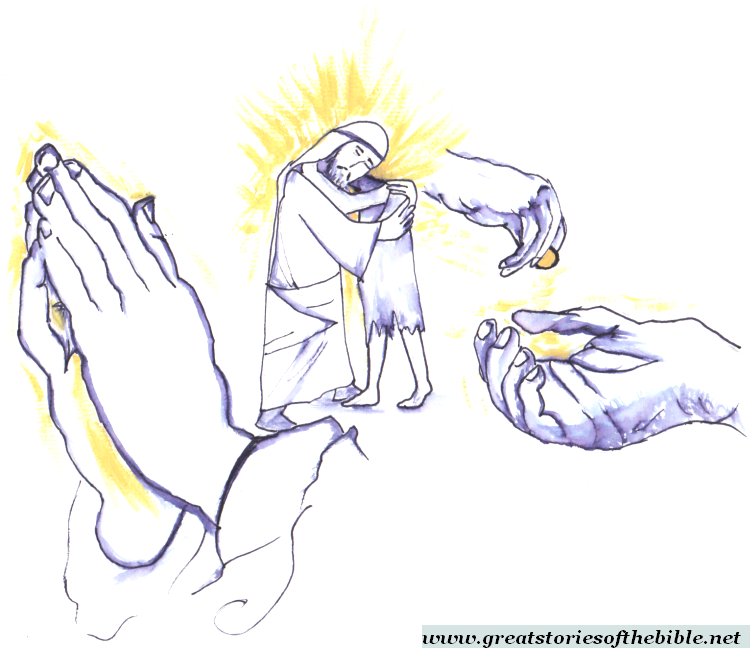Lent
The purification of the heart
We leave for a moment the Stories of the Bible to read a Special about Lent, the forty days of preparation for Easter. It is a great gift of the Lord, an opportunity to get life better through the three conversion means proposed by the Church: fasting, charity, prayer. The first two practices are well described in a passage by the prophet Isaiah, that I quote: «Yet they seek me daily, and delight to know my ways: as a nation that did righteousness, and did not forsake the ordinance of their God, they ask of me righteous judgments; they delight to draw near to God. ‘Why have we fasted,’ say they, ‘and you do not see? Why have we afflicted our soul, and you take no knowledge?’ “Behold, in the day of your fast you find pleasure, and exact all your labors. Behold, you fast for strife and contention, and to strike with the fist of wickedness: you do not fast this day so as to make your voice to be heard on high. Is such the fast that I have chosen? the day for a man to afflict his soul? Is it to bow down his head as a rush, and to spread sackcloth and ashes under him? Will you call this a fast, and an acceptable day to the LORD? “Isn’t this the fast that I have chosen: to release the bonds of wickedness, to undo the bands of the yoke, and to let the oppressed go free, and that you break every yoke? Isn’t it to distribute your bread to the hungry, and that you bring the poor who are cast out to your house? When you see the naked, that you cover him; and that you not hide yourself from your own flesh? Then your light shall break forth as the morning, and your healing shall spring forth speedily; and your righteousness shall go before you; the glory of the LORD shall be your rear guard. Then you shall call, and the LORD will answer; you shall cry, and he will say, ‘Here I am.’» (Isa 58,2-9a).

The Lord harshly rebukes his people through the prophet and even speaks to us today: God is not pleased by mere religious practices of “programmed mortifications”, nor do they ensure that the man who does them is really closer to Him. The only abstinence that God wants is from evil; material fasting is only a metaphor and a medium to get that other interior fasting. Therefore every man in real penitence should avoid all occasions of injustice toward others and, positively, share with them all the good that he has. We can read what Pope Benedict XVI wrote about Christian charity: «Practical activity will always be insufficient, unless it visibly expresses a love for man, a love nourished by an encounter with Christ. My deep personal sharing in the needs and sufferings of others becomes a sharing of my very self with them: if my gift is not to prove a source of humiliation, I must give to others not only something that is my own, but my very self; I must be personally present in my gift. This proper way of serving others also leads to humility. The one who serves does not consider himself superior to the one served, however miserable his situation at the moment may be. Christ took the lowest place in the world—the Cross—and by this radical humility he redeemed us and constantly comes to our aid. Those who are in a position to help others will realize that in doing so they themselves receive help; being able to help others is no merit or achievement of their own. This duty is a grace» (Deus Caritas Est, nos. 34-35).
The third conversion means is prayer, which can be perceived by Christians as something boring, a heavy duty towards God that you would rather avoid. But does a creator and almighty God really need to be “fed” by human prayer? «For, although you have no need of our praise, yet our thanksgiving is itself your gift, since our praises add nothing to your greatness but profit us for salvation» (from Common Preface IV). Prayer is for humans, not for God; not a duty, but the right of every baptized person. As a true child through Baptism every Christian has in fact the right to speak to the LORD with the confidence to be listened to with love. Let’s then spend some more time in that divine communion that feeds our heart!
In the conversion means that the Church proposes constancy does more than quantity. The Desert Fathers compare the human heart to a wide field, full of thistles and thorns, that a father asks his young son to clean up. To his son’s initial debasement, looking at the enormity of the task, the father answers: «“My son, work every day the piece of land you can occupy sleeping. You will progress in the work gradually without discouraging”. The young man did as he was told and in a short time the property was cleaned.So you, my brother, do a little at a time and you will not discourage» (quoted from A. Grün, L’accompagnamento spirituale nei Padri del deserto, Paoline 2005, p. 50).